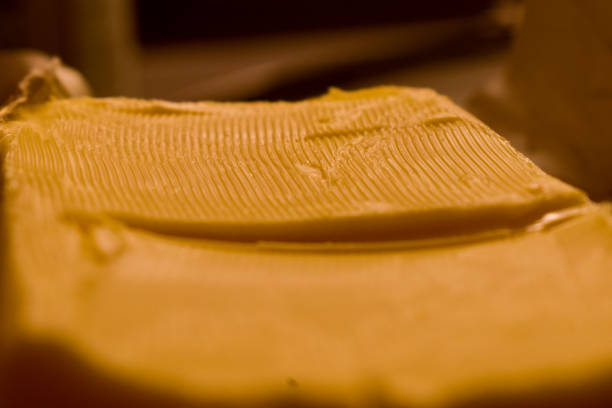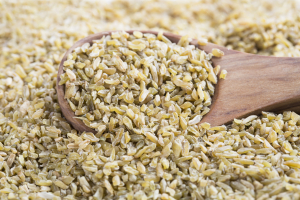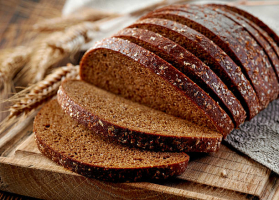Top 6 Health Benefits of Grass-Fed Butter
Butter is a popular dairy product prepared mostly from cow's milk. It is essentially milk fat in solid form. It's prepared by churning milk until the butterfat ... read more...and buttermilk separate. Surprisingly, what dairy cows consume can have an impact on the nutritional value of the milk they produce, as well as the butter they make from it. Although most cows in the United States are fed maize and grain, grass-fed beef and dairy products are growing more popular. Here are the potential health benefits of grass-fed butter.
-
Butters, both regular and grass-fed, are heavy in fat and calories. They are also high in vitamin A, a fat-soluble vitamin. However, research suggests that grass-fed butter may be more healthy. It has a larger concentration of beneficial unsaturated fatty acids in particular. Grass-fed butter, for example, has more omega-3 fatty acids. These contain anti-inflammatory qualities and have been associated with a variety of health advantages. According to one study, grass-fed butter has around 26% more omega-3 fatty acids than conventional butter.
Another study discovered that grass-fed dairy has up to 500% more conjugated linoleic acid (CLA) than conventional dairy. Several studies have connected this fatty acid to a variety of potential health advantages. CLA, for example, has shown promise anticancer benefits in animal and test-tube trials, though further study is needed. In addition to having a better lipid profile, grass-fed butter is thought to have higher in vitamin K2, which is crucial for bone and heart health.

More nutritious than regular butter 
More nutritious than regular butter -
Vitamin A is a fat-soluble vitamin that is deemed important. This implies that your body cannot produce it, thus it must be consumed. Grass-fed butter, like conventional butter, is high in vitamin A. Each tablespoon (14 grams) of grass-fed butter contains approximately 10% of the RDA for this vitamin.
Vitamin A is required for normal eyesight, reproduction, and immunological function. It also helps with growth and development, as well as the formation and maintenance of healthy teeth, bones, and skin. Grass-fed butter is high in vitamin A, a substance that is necessary for immune function, eyesight, and other functions.

A good source of vitamin A 
A good source of vitamin A -
Butter contains a lot of beta carotene, which your body turns into vitamin A as needed to satisfy your daily requirements. According to research, grass-fed butter may have significantly more beta carotene than normal butter. In one study, butter prepared from the milk of 100% grass-fed cows contained the most beta carotene, whereas butter from cows given a mixed diet of grass and maize contained the least. Beta carotene is another well-known and effective antioxidant. Antioxidants protect your cells from harm produced by unstable chemicals known as free radicals.
A plethora of observational studies has linked a higher diet of beta carotene-rich foods to a lower risk of various chronic illnesses, including age-related macular degeneration (AMD), type 2 diabetes, and some forms of cancer. These studies, however, were primarily concerned with the consumption of beta-carotene-rich fruits and vegetables, rather than the consumption of grass-fed butter.

Rich in beta carotene 
Rich in beta carotene -
Vitamin K is a fat-soluble vitamin that comes in two forms: vitamin K1 and vitamin K2. In most diets, vitamin K1, also known as phylloquinone, is the primary source of vitamin K. It is mostly present in plant foods like green leafy vegetables. Vitamin K2 is a little-known yet vital vitamin. It is mostly found in fermented foods and animal products, especially grass-fed butter, and is also known as menaquinone. Although vitamin K2 is less frequent in the diet, it is essential for general health. It regulates calcium levels, which is important for bone and heart health.
By encouraging your bones to absorb more calcium, vitamin K2 promotes bone health. Several studies have discovered that those who ingest more vitamin K2 had fewer bone fractures. Vitamin K2 also aids in the removal of excess calcium from the bloodstream, which may aid in the prevention of dangerous calcium deposits and plaque buildup in your blood vessels. A high intake of vitamin K2 (32 mcg per day) was related to a 50% reduction in the risk of mortality from heart disease in large population research comprising 4,807 persons.

Contains vitamin K2 
Contains vitamin K2 -
Monounsaturated and polyunsaturated fats are examples of unsaturated fats. These fats have long been thought to be healthful, with research repeatedly linking them to heart health advantages. Strong scientific data suggests that substituting part of your saturated fat in your diet with unsaturated fat may lower your risk of heart disease. One simple method to accomplish this is to replace normal butter with grass-fed butter. Several studies have been conducted to compare the products of grass-fed versus conventionally-fed dairy cows. They discovered that grass-fed butter has more unsaturated fats than ordinary butter.
Grass-fed butter, on the other hand, has a large quantity of saturated fat. According to new research, saturated fat consumption may not be connected to heart disease as previously assumed. It is, however, preferable to consume a range of fats, not simply saturated fats, from nutritional sources such as nuts, seeds, and fatty fish.

High in unsaturated fatty acids 
High in unsaturated fatty acids -
Conjugated linoleic acid (CLA) is a kind of fat found mostly in meat and dairy products from ruminant animals such as cows, sheep, and goats. Grass-fed dairy products, notably grass-fed butter, are thought to be particularly rich in CLA. In one trial, grass-fed cows produced milk with 500% more CLA than corn-fed cows. According to research, CLA may provide a number of health advantages. CLA may help prevent some chronic illnesses, such as type 2 diabetes, heart disease, and possibly certain malignancies, according to animal and test-tube research.
CLA, for example, caused cancer cell death and reduced the proliferation of breast and colon cancer cells in test-tube tests. Human-research findings, on the other hand, are mixed. Some studies show that those who consume more CLA in their diets may have a lower risk of breast cancer, whereas others have found no link. CLA supplements appear to have the ability to lessen the risk of heart disease in mice and rabbits by delaying and decreasing plaque accumulation in the arteries. Nonetheless, the few human studies that have looked at CLA's effect on plaque development have found little benefit.

Contains conjugated linoleic acid 
Contains conjugated linoleic acid



























